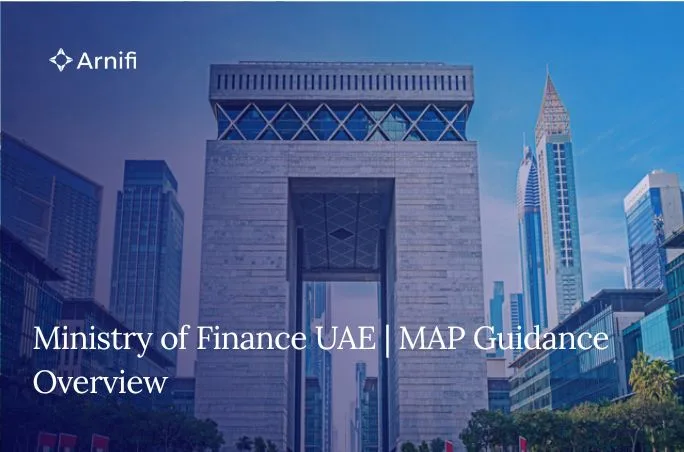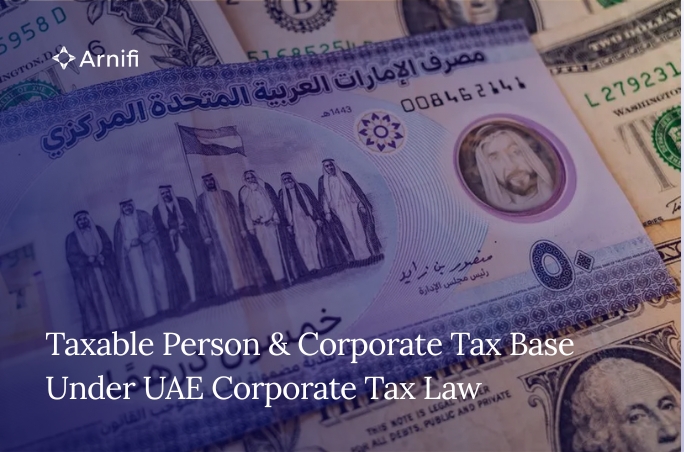Mutual Agreement Procedure (MAP) Guidance Issued by the UAE Ministry of Finance
by Ishika Bhandari Nov 27, 2025  8 MIN READ
8 MIN READ

Table of contents
- Role of the Ministry of Finance in Treaty Disputes
- How Does New MAP Guidance Help
- Key Features of the UAE MAP Guidance
- When can a Taxpayer ask for MAP?
- Steps to File a MAP Request With The Competent Authority
- Using MoF Digital Portals for MAP and Other Services
- Practical Takeaways for Businesses Considering MAP
- Conclusion
- FAQs
Double tax disputes can quickly drain time and cash when two countries both seek to tax the same income. The ministry of finance UAE has released Mutual Agreement Procedure guidance to give taxpayers a clearer route through these disputes.
The guidance explains who can use MAP, the time limits for requests and the information needed in a claim. It also confirms how the UAE Competent Authority works with foreign tax authorities under double tax treaties.
Role of the Ministry of Finance in Treaty Disputes
The Ministry of Finance acts as the UAE “Competent Authority” for double tax treaties. That term appears in many DTAs and designates the body that can talk to foreign tax authorities on treaty matters.
When a double tax issue arises, domestic appeal routes might not be enough. A court can interpret UAE law yet cannot bind the foreign authority. MAP steps in at that point. It lets the UAE Competent Authority and the foreign counterpart negotiate an outcome that aligns with the treaty.
The new guidance describes this process in structured steps and confirms that the ministry aims to resolve cases within OECD best practice timelines, as long as taxpayers provide full information on time.
How Does New MAP Guidance Help
MAP is available under treaty articles, yet historically many taxpayers did not use it. Some did not know that MAP existed. Others worried about long timelines or unclear requirements. The guidance tackles those concerns directly.
The document sets out common sources of treaty conflict such as transfer pricing adjustments and disputes about permanent establishments. It explains that taxpayers can seek relief when taxation is not in line with the relevant treaty, including economic double taxation in some cases.
The guidance also provides coordination with domestic remedies. A court judgment or Tax Dispute Resolution Committee decision can limit how far the Competent Authority may move during MAP. Taxpayers, therefore, need a strategy that joins domestic appeals and MAP requests instead of treating them as separate tracks.
For MAP to work, tax authorities need clean numbers and a clear trail of entries. Arnifi’s accounting and bookkeeping services in UAE help keep ledgers, tax returns and cross border adjustments aligned, so treaty arguments rest on reconciled figures instead of rough estimates.
Key Features of the UAE MAP Guidance
The MAP guidance brings several concrete features that help taxpayers plan.
- Clear statement that MAP is available under the UAE treaty network to relieve taxation that is not treaty compliant, including economic double taxation in certain cases.
- A typical three year time limit to file a MAP request, counted from the moment the taxpayer becomes aware that double taxation may arise.
- Detailed lists of information required in a request, including facts, treaty articles involved and calculations of the tax at stake.
- Confirmation that the UAE seeks to resolve cases as soon as possible and in line with OECD best practice timelines on MAP.
When can a Taxpayer ask for MAP?
A taxpayer can request MAP when actions of one or both treaty states cause or may cause taxation that is not in line with the treaty.
Typical triggers include:
- A transfer pricing adjustment that increases profits in one country without a matching reduction in the other.
- A dispute about the existence of a permanent establishment or the profit that should be allocated to that establishment.
- Conflicting residence positions where each state treats the entity or person as resident, leading to double tax on the same income.
Important Advice: Not every case will qualify. The guidance confirms that standard domestic disputes without a treaty angle are outside scope. It also notes that applications tied to abusive schemes may be refused. Each case still depends on the treaty wording and the specific facts, so early technical review is vital.
Steps to File a MAP Request With The Competent Authority
The guidance sets a structured sequence for taxpayers that wish to use MAP.
- Identify the relevant treaty and the article which is not applied correctly, then collect assessments and correspondence that show the issue.
- Prepare a written request addressed to the UAE Competent Authority that explains the facts, the treaty analysis and the double taxation suffered, plus any domestic appeals in progress.
- Submit the MAP request within the treaty time limit, usually three years after becoming aware of the potential double taxation.
- Respond quickly to any follow up questions and provide extra documents that the Competent Authority or foreign authority may request.
Important Advice: Once a case is accepted, the Competent Authorities start discussions. Taxpayers usually do not join these meetings directly yet may be asked for clarifications. The outcome might fully remove double taxation, partially reduce it or in rare cases leave it in place. OECD statistics show that globally a large share of MAP cases eliminate double taxation entirely, which makes this channel worth serious attention.
Using MoF Digital Portals for MAP and Other Services
The guidance itself sits on the Ministry’s website together with other tax and treaty material. The MoF site also hosts key e services such as tax classification requests, international treaties dashboards and supplier services.
To access many online services, taxpayers or advisers need to use the main digital access point often called the Ministry of Finance UAE login. The site links to the separate mof services portal, which supports UAE Pass, the national digital identity that gives one login to thousands of government and private services across the country.
Another area of interest for many businesses is Ministry of Finance UAE supplier registration. The Federal Supplier Register and Digital Procurement Platform allow companies to register once and then participate in federal tenders, submit bids and issue electronic invoices to federal entities.
The ministry notes that more than ten thousand suppliers already use this register and that registration time has fallen to about one working day with fully digital processes.
Practical Takeaways for Businesses Considering MAP
MAP is not a quick email or a light complaint. It is a treaty process that needs clear facts, careful analysis and patience. But it can deliver real relief when both states engage constructively.
While facing cross border tax adjustments that create double tax risk, check the relevant treaty and time limits early. Align domestic appeal steps with a potential MAP request and keep your documentation in order so the Competent Authority can argue your case well with its counterpart.
Conclusion
MAP gives UAE taxpayers a structured path to relieve double taxation, but only when facts and numbers hold up under joint review. Arnifi’s accounting and bookkeeping services help build that foundation, keeping records MAP ready so advisers and Competent Authorities can focus on treaty strategy instead of fixing basic data.
FAQs
Q1. What is the main purpose of MAP in the UAE context?
MAP allows the UAE and a treaty partner to resolve double taxation that arises when both states seek to tax the same income or when a treaty is applied inconsistently. It uses negotiation between Competent Authorities instead of court judgments in two countries.
Q2. Who is the Competent Authority for MAP in the UAE?
The Ministry of Finance acts as the Competent Authority for UAE double tax treaties. It handles MAP requests, exchanges information with foreign counterparts and seeks outcomes that align with the wording and intent of the relevant treaty.
Q3. How long does a taxpayer have to submit a MAP request?
Most UAE treaties give taxpayers up to three years to request MAP after they become aware that actions of one or both states may lead to taxation not in line with the treaty. The guidance confirms this typical period, but specific treaty text still governs.
Q4. Can a taxpayer use MAP and domestic appeals at the same time?
Yes, although interaction rules matter. Taxpayers often pursue domestic remedies and MAP together, yet a final domestic decision can restrict the relief that the Competent Authority may grant. Strategic planning on timing and scope is therefore very helpful.
Q5. Does filing a MAP request stop tax collection in the UAE?
MAP itself does not automatically suspend collection. Collection relief depends on domestic law, available payment arrangements and any specific decisions by the Federal Tax Authority or courts. Taxpayers should discuss payment plans and cash impact while MAP discussions continue.
Top UAE Packages

Related Articles
Top UAE Packages



